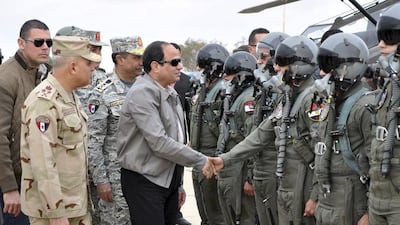CAIRO // Faced with a new threat to its national security, Egypt may, at least for now, go it alone in battling ISIL militants in neighbouring Libya.
Egyptian warplanes struck ISIL targets last week in the city of Derna, an extremist stronghold, in retaliation for the beheading of 21 Egyptian Coptic Christians there by the militants.
But Cairo’s desire to see the creation of a UN-backed force to intervene militarily in Libya has been stymied at the UN Security Council last week.
After consultations with members of the UN Security Council, Egypt dramatically lowered its expectations, seeking only a lifting of the arms embargo imposed on Libya’s internationally recognised government, which is headquartered in the east of the country in Tobruk. The UN imposed an arms embargo on Libya in Febraury 2011 when longtime dictator Muammar Qaddafi’s forces cracked down on pro-democracy protesters.
But even that was rejected, out of fear that weapons would end up in the hands of extremists.
The way forward for Libya, said the US, Britain and several of its European allies, is for a political settlement that reconciles the country’s two rival governments.
Talks between the two governments have been going on for months under the auspices of the United Nations, but there is no telling when, if ever, they will come to fruition.
Egypt, for its part, views the talks to reconcile the two governments and the threat posed by ISIL to its own security and that of Europe as twin challenges that should be tackled simultaneously.
The rise of extremists in Libya has been the cause of serious problems in Egypt and the declaration of allegiance to ISIL by many of the militant groups in the oil-rich nation has deepened Egypt's fears.
The threat so close to Egypt’s western gateway is compounded by the burgeoning insurgency on Egypt’s eastern flank, in the strategic Sinai Peninsula, where militants such as the Ansar Beit Al Maqdis also swore allegiance to ISIL.
The two threats are linked. Since Qaddafi was ousted in 2011, militants in Libya have smuggled huge amounts of weapons across the porous Egypt-Libya desert border. The weapons eventually reached the extremists in Sinai, where they are used to attack army and security forces with devastating effect.
Egypt wanted an international cover of legitimacy to eliminate the threat from Libya, and publicly called for “material and political” help to deal with the militants there. It also said it wanted an international coalition that mirrors the one staging airstrikes against ISIL in Iraq and Syria since last summer.
For now at least, this is not happening, leaving Egypt with no choice but to find other ways to deal with the threat.
One is to secure a clear-cut mandate from the Arab League that would give Egypt and fellow Arab states that share Cairo’s concerns the green light to intervene militarily in Libya. The scope and duration of such an intervention is difficult to predetermine, but it would most likely exclude ground operations, at least in the initial stages.
Another is the go-it-alone approach, which carries a similar set of limitations.
Egypt does not want to be dragged into a ground war in Libya that could be drawn out and costly.
Meanwhile, Cairo realises its limitations, and the vast cost, of a sustained air campaign. Quick and surgical operations against high value targets inside Libya is another option, but the success of such operations is never guaranteed and the chances of one such operation going terribly wrong is very real.
Already, Egypt has beefed up its border defences and is using aircraft as well as ground patrols to monitor movements in the border area.
But another round of mass beheadings by ISIL could force Egypt - partially under domestic pressure - to launch another set of airstrikes or even a small ground operation.
Airstrikes and small surgical ground operations, however, would not eliminate the threat posed by ISIL and Egypt is likely to continue to hope that Western powers would come on board and seek a UN mandate for a military coalition that would operate more forcefully to contain the militants in Libya.
foreign.desk@thenational.ae

